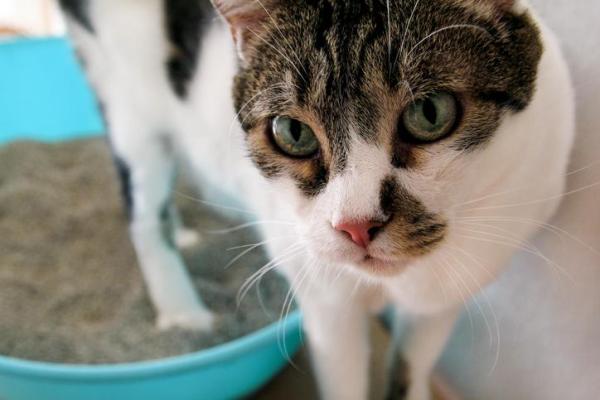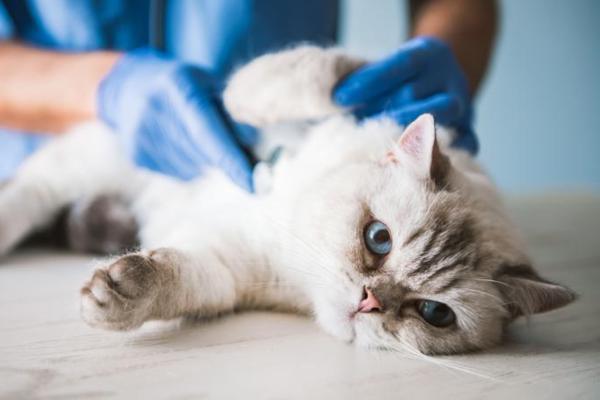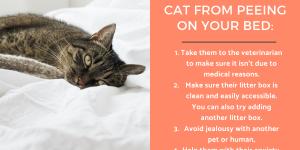Why Does My Cat Keep Licking His Penis?



See files for Cats
You may see your cat push his penis out and lick it, something which can be a normal part of their grooming behavior. As very hygienic animals, felines will cover every inch of the fur they can reach to ensure they remain healthy and keep their coat in good condition. While they may do it for an amount of time longer than we would consider polite, it is usually a normal and healthy behavior. There is a limit and if a cat keeps licking his privates, it might be a sign of a health problem.
AnimalWised better understands the nature of this problem by asking why does my cat keep licking his penis? We discover the causes of excessive licking of the privates in cats, as well as what treatment options are available.
Do neutered male cats get erections?
Before we discus why a male cat will push out their penis and lick it, we need to know why it may be exposed in the first place. In an unneutered male cat, the reasons might be fairly obvious. However, it can still occur when caring for neutered male cats also. Let's explain a little further.
Unneutered male cats
If cat is not neutered and is otherwise healthy, their sex drive will remain intact. It may lessen as they age, but it is natural for younger cats to have a high sex drive. This is especially so when they see a female cat in heat. When a cat gets an erection, their penis will become exposed outside their fur. Their penis does not have any fur and is red in color. However, it is unlikely a cat will keep licking his penis for this reason.
Feline penises also have penile spines. These spines are thought to stimulate the female cat's vagina for ovulation. It is a natural part of cat's mating, but it can sometimes be uncomfortable for the female. It is important to know the difference between normal penile spines and abnormal growths. It has been shown that the amount of spines is related to hormone levels. A study in the journal The Anatomical Record showed that cats which were given “larger doses of [testosterone] maintained more papillae and higher levels of sexual behavior”[1].
Neutered male cats
It is a misconception that neutered male cats cannot achieve erections. If a male cat has been castrated, then their testicles have been removed, but their penis should still function normally. Blood can still be pumped to this area, meaning a cat can still get a physical erection. Due to castration, this will not happen as much as sexually intact male cats.
Castration will affect a cat's sex drive. This is one of the main reasons for the procedure as it prevents unwanted pregnancies and also stabilizes their behavior. Learn more with our article on the benefits of neutering a cat.
Do cats masturbate?
Now we know that erections do not stop in cats even if they have been neutered, we may want to know why. When a sexually intact male matures, they will have a strong desire to mate. Especially if they do not have access to a female cat in heat, it is common for them to masturbate to relieve sexual tension. This can be seen in licking their own penis, but it is usually more common to see them mount objects, especially soft materials like blankets.
Neutered male cats may still engage in masturbation or even mounting of other cats. This occurs more in cats which have been neutered a little later in life as mounting and masturbation has become an ingrained habit. A cat will mount objects, other cats or even other animals. Their penis may be pushed out, but they will not usually lick it if it is related to their sex drive. There are other reasons this is likely to happen which we explain below.

Symptom of urinary disease
Generally, if your cat pushes out their penis for non-sexual reasons, it indicates a problem with the urinary tract. In these cases, we can see other symptoms such as excessive licking of the genital area, pain in the abdomen, pain while urinating and an effect on the frequency and amount of urine produced. Cats with a urinary tract infection will urinate more often throughout the day, but will produce less urine each time.
In some cases, a cat with a urinary tract infection will not be able to urinate at all. You may see them going to the litter box and trying to urinate unsuccessfully. They may vocalize out of frustration. Other times they may suffer incontinence and urinate outside of their litter box. Blood may be present in the cat's urine, something known as hematuria. If this occurs, you will need to take your cat to the vet.
Other symptoms of feline urinary tract infection may include:
- Anorexia
- Apathy
- Vomiting
- Dehydration
Due to the discomfort and agitation of the urinary tract, you might see your cat keeps licking his penis. He will push it out so they can have better access. The reason for licking is likely as a way to provide relief due to their frustration.
You should take your cat to the veterinarian if you witness these symptoms. Delaying doing so may exacerbate the situation and cause further discomfort. A cat which does not urinate after 24 hours can go into shock and suffer irreparable damage. Treatment will depend on the cause, but will require antibiotics in the case of bacterial infection. The cat may need supportive treatment such as fluid therapy in the case of dehydration.
FLUTD (feline lower urinary tract disease)
FLUTD is an acronym for feline lower urinary tract disease. This is a broad term which encompasses a wide range of conditions and diseases which affect the lower urinary tract. The symptoms they produce will be similar and are the same as the ones mentioned in the section above. These diseases may result in your cat pushing out their penis and often you can observe a change in color or inflammation.
Although lower urinary tract infections are relatively rare in cats, it is important to note they “can predispose [cats] to opportunistic infections as a complication of the underlying disease or its treatment”[2]. This means that many cats who have an initial infection might be more likely to get one again or suffer a related problem.
A veterinarian will need to confirm diagnosis of FLUTD in cats. They will do this by carrying out a urinalysis, an ultrasound and giving a general exam. Within the range of FLUTDs, we might find the cat has a case of idiopathic cystitis. Idiopathic means that the cause is unknown, but it doesn't mean effective treatment can't be implemented. Cystitis is an inflammation of the bladder which is considered part of the urinary tract. It might be cause by bladder stones, an infection or an obstruction in the ducts.
Treatment of a urinary tract infection will likely involve a combination of antibiotics and lifestyle changes. However, a recent study in the British Medical Journal found that, when dealing with bacterial cystitis, treatment should be “based on the locally determined bacterial spectrum and antibiotic susceptibility”[3]. This means it is best to determine the exact bacteria which is causing the inflammation before providing appropriate treatment.
Lifestyle changes for cats with FLUTD
Once your veterinarian has diagnoses your cat with FLUTD, they will provide a treatment plan which should be tailored to the individual cat. This is partly why you should not treat your cat yourself. You may miss out certain details and even worsen a problem. If the problem is due to obstructions or stones, it is even possible the vet will recommend surgery.
However, there are some things you can do to aid a cat's recovery from FLUTDs. Some causes of lower urinary tract infections, particularly those for idiopathic cystitis are sometimes caused by stress. If this is the case, treatment will may not even involve antibiotics as it can help build resistance. Lifestyle and environmental factors might need to be changed. Once these changes are made the cat should lick their penis less or stop completely.
Feline urethral obstruction
The feline urethra is a small opening, but it is possible for foreign bodies to become lodged in there. Especially if there are issues with the cat's environment or their own personal hygiene, dirt and other particles can cause an obstruction. In these cases, we might see the cat trying to pee, but having difficulty. Secondary bacterial infections can also worsen the problem.
Urinary or kidney stones can also enter the urinary tract and cause obstruction. These are usually related to diet, but can also be influenced by factors such as stress. When particles build up uroliths form which can be very pain for the cat, especially when trying to urinate.
In these cases, the cat will keep licking his penis to both try to remove the obstruction and relieve the discomfort it causes. Treatment will vary according to the extent of the problem, but surgical removal is often required for both urinary stones and foreign objects. Antibiotics will be used to treat any secondary infections and dietary changes will be required to prevent their formation in the future.
Learn more with our article on a diet for cats with kidney stones.

Tips to avoid urinary problems in cats
We need to pay close attention to our cat's bathroom habits. If we notice signs of urinary problems we will take them to the vet. It is likely an explanation of why our cat's penis is exposed and why they might be licking it. To help prevent these problems re-occurring, we can follow this tips:
- A cat's hydration level is very important to their overall health, but particularly to their urinary tract. We need to make sure our cat drinks enough water. To do so, we can leave different water sources around the home. Cats love fresh water, especially if it is running, so a kitty water fountain is a great idea to ensure your cat is getting enough fluids.
- A balanced diet is also imperative. It helps to prevent the formation of crystals in the urine which can turn into calcium deposits and even lead to kidney and bladder stones.
- Reducing your cat's stress is also a general benefit with a specific result. Enrich the cat's environment with toys and intelligence games. Be careful when changing elements in their environment, but you can provide scratchers and generally ensure they do not have any antagonistic elements on their world.
- If you have more than one cat in the home, it is very important you have at least one litter box each. Ideally, you should have one for each number of cats in the household, plus an additional litter box. You also need to ensure you clean then frequently.
Of course, if you see symptoms persist, it is vital you take your cat to the veterinarian.

This article is purely informative. AnimalWised does not have the authority to prescribe any veterinary treatment or create a diagnosis. We invite you to take your pet to the veterinarian if they are suffering from any condition or pain.
If you want to read similar articles to Why Does My Cat Keep Licking His Penis?, we recommend you visit our Other health problems category.
1. Aronson, L. R., & Cooper, M. L. (1967). Penile spines of the domestic cat: their endocrine-behavior relations. The Anatomical record, 157(1), 71–78.
https://doi.org/10.1002/ar.1091570111
2. Dokuzeylül, B., Kahraman, B. B., Bayrakal, A., Siğirci, B. D., Çelik, B., Ikiz, S., Kayar, A., & Or, M. E. (2015). Bacterial species isolated from cats with lower urinary tract infection and their susceptibilities to cefovecin. Irish veterinary journal, 68(1), 2.
https://doi.org/10.1186/s13620-015-0030-9
3. Teichmann-Knorrn, S., Reese, S., Wolf, G., Hartmann, K., & Dorsch, R. (2018). Prevalence of feline urinary tract pathogens and antimicrobial resistance over five years. The Veterinary record, 183(1), 21.
https://doi.org/10.1136/vr.104440







